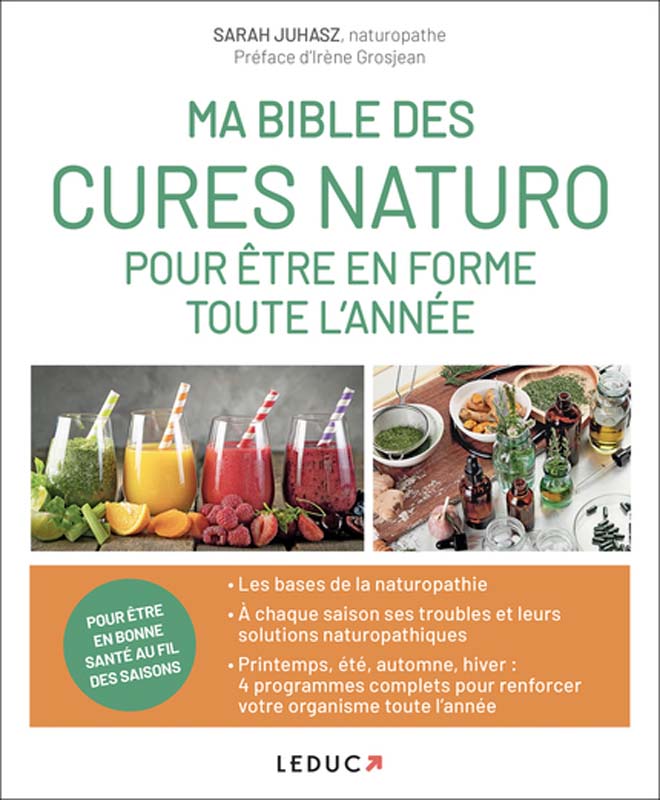Irène Grosjean recommends the purges (see this video). For several decades, the purges were practiced in a common way as a prevention until the beginning of the century and the Vidal drug dictionary, of the pharmacists from this time, listed as well a large number of purgative substances. This health practice, like many others (fasting, enemas, use of plants...) then sank into oblivion and gradually disappeared from official institutional teachings and reference books in the 1900s as Louis Fouché et Fabien Moine explain it very well in this introduction video of "ReInfoSanté".
On our side, we regularly do saline or oil purges as day-to-day maintenance. A purge is strictly speaking an internal cleaning.
Saline purges enable to treat crystalloid waste and are done with magnesium salts.
Oil purges are done with castor oil and will clean the lymph and the hepatobiliary sphere. Dr. Miguel Barthéléry and Irène Grosjean tackle it fully in the online training "Life In Abundance".
Sarah Juhasz, engineer in biological engineering and naturopath, in her excellent book "My bible of naturopathic cures", scientifically explains to us the action of castor oil p.228:

"Castor oil plant (ricinus communis) is a plant of the family of Euphorbiaceae, which grows mainly in tropical regions, but is also found in France in sunny regions. It is a plant whose flowering period is summer. The small flowers are surprising: in ear, followed by bright red capsules, ovoids and covered with spikes. They contain very pretty seeds containing an alkaloid, the ricin, a powerful toxic agent. The oil, made from the seeds by pressing, does not contain the ricin, which is exclusively in the endosperm of the castor oil seeds, so it is not "toxic", as most people think. This one is used in treatment for centuries, described for the first time in the Ebers papyrus of the ancient Egypt more than 3,500 years ago.
Castor oil is unique due to its high content of ricinoleic acid (90%) which, after oral ingestion, is metabolized quickly by lipases and absorbed in quantity by the intestines to go to the lymph and contribute to its purification. Castor oil produces a strong laxative effect used internally, and makes it possible to safely trigger the work in pregnant women at full term, by activating the cells of the smooth intestinal and uterine muscles via certain receptors. Castor oil is also classified as safe and effective for use as a stimulant laxative by the Food and Drug Administration (FDA) in the United States.
In addition to ricinoleic acid, the castor oil would contain phenolic compounds including flavonoides, amino acids, lerpenes, phytosterols, etc., these compounds confer the castor oil antidiabetic, anti-inflammatory, antimicrobial, antioxidant, hepatoprotective, insecticides and healing properties. Its use is contraindicated in pregnant women.
________________________________________
Sources :
- "Ricinoleic acid : Current view of an ancient oil." Gaginella TS, Phillips SF. American Journal of Digestive Diseases. 1975;20:1171-1177.
- "Castor oil induces taxation and uterus contraction via ricinoleic acid activating prostaglandin EP3 receptors. Tunaru S & al. Proc Natl Acad Sci USA. 2012 Jun 5;109(23):9179-84."
- Toxicology and pharmacology of sodium ricinoleate. Burdock GA, Carabin IG, Griffiths JC. Food and Chemical Toxicology. 2006 Oct,44(10): 1689-98.
- « Castor oil for induction of labor in post-date pregnancies : A randomized controlled trial. » Gilad R,Hochner H
- « Castor oil induces laxation and uterus contraction via ricinoleic acid activating prostaglandin EP3 receptors. » Tunaru S & al. Proc Natl Acad Sci USA. 2012 Jun 5;109(23):9179-84.
- « Final report on the safety assessment of Ricinus Communis (Castor) Seed Oil, Hydrogenated Castor Oil, Glyceryl Ricinoleate, Glyceryl Ricinoleate SE, Ricinoleic Acid, Potassium Ricinoleate, Sodium Ricinoleate, Zinc Ricinoleate, Cetyl Ricinoleate, Ethyl Ricinoleate, Glycol Ricinoleate, Isopropyl Ricinoleate, Methyl Ricinoleate, and Octyldodecyl Ricinoleate. » International Journal of Toxicology. 2007;26 Suppl 3:31-77.
- « Review - Ricinus emmunis - Ethnomédicinal uses and pharmacological activities. » Marwat SK, Rehman F & al. Pakistan Journal of Pharmaceutical Sciences. 2017 Sep;30(5): 1815-1827.








